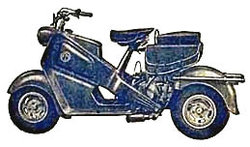Difference between revisions of "F.M."
m |
m |
||
| (One intermediate revision by the same user not shown) | |||
| Line 1: | Line 1: | ||
{{X}} | {{X}} | ||
| + | [[Image:molteni 125 t. 52 brochure.jpg|right|thumb|250px|'''1952 F. Molteni 125cc''' [http://www.motomanuali.com <small>Source</small>]]] | ||
| + | |||
| + | |||
| + | == 1925 - 1927 == | ||
| + | '''F.M.''' (''Ditta Molteni'', [[Erba]], [[Como]], later ''Moto Molteni'', [[Molteni]] later ''Officine Meccaniche Fratelli'', [[Milan]]) was founded by the [[Molteni]] brothers in [[Milan]] and built [[motorcycles]] with [[MAG]] and [[Bradshaw]] engines, frames, forks and fenders in the league. | ||
| − | |||
| − | |||
| + | == 1950 -1954 == | ||
| − | + | After a period of inactivity, in the forties, FM returned with the FM 125 with a two stroke engine. In 1950 the T 50 scooter was released. The design, by ''R. Juga'' in collaboration with ''A. Pajaga'', had a truss frame with single central cast alloy, which incorporated the fuel reservoir and the light support on the saddle. The swing arm was built on top of the truss frame. The engine was a two-stroke 125 cc with a three-speed [[gearbox]] with the control on the handlebar and a chain driven [[transmission]]. The 1950-54 production was for scooters with a beam alloy frame and a 125 cc two-stroke engine. In 1952 they developed a motorcycle with 125 cc. The front fork was cast in one piece, including the fender that contained a housing for the spring suspension. In 1954, the company closed its doors for good. | |
Latest revision as of 14:27, 15 April 2010

1925 - 1927
F.M. (Ditta Molteni, Erba, Como, later Moto Molteni, Molteni later Officine Meccaniche Fratelli, Milan) was founded by the Molteni brothers in Milan and built motorcycles with MAG and Bradshaw engines, frames, forks and fenders in the league.
1950 -1954
After a period of inactivity, in the forties, FM returned with the FM 125 with a two stroke engine. In 1950 the T 50 scooter was released. The design, by R. Juga in collaboration with A. Pajaga, had a truss frame with single central cast alloy, which incorporated the fuel reservoir and the light support on the saddle. The swing arm was built on top of the truss frame. The engine was a two-stroke 125 cc with a three-speed gearbox with the control on the handlebar and a chain driven transmission. The 1950-54 production was for scooters with a beam alloy frame and a 125 cc two-stroke engine. In 1952 they developed a motorcycle with 125 cc. The front fork was cast in one piece, including the fender that contained a housing for the spring suspension. In 1954, the company closed its doors for good.
Send what you have to:
| Motorcycle Information and Photos by Marque: A - B - C - D - E - F - G - H - I - J - K - L - M - N - O - P - Q - R - S - T - U - V - W - X - Y - Z |
| Car Information and Photos by Marque: A - B - C - D - E - F - G - H - I - J - K - L - M - N - O - P - Q - R - S - T - U - V - W - X - Y - Z |